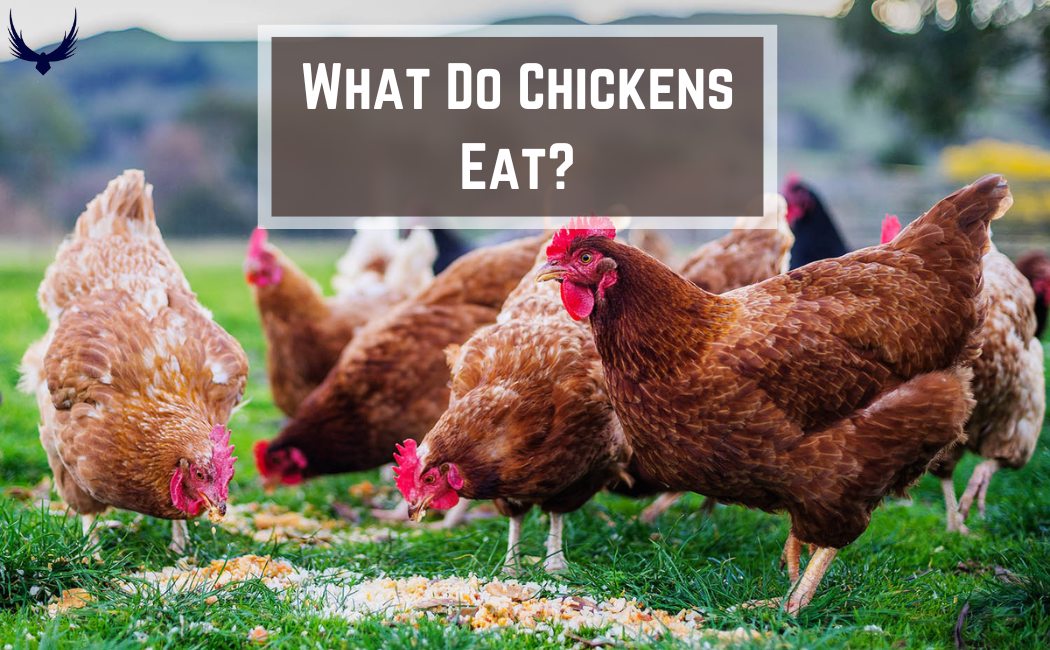Chickens are friendly farm birds that like to eat a lot. People who raise chickens often wonder what do chickens eat. Chickens eat more than just bugs and grains they find on the ground. They can enjoy a variety of foods like kitchen scraps and garden plants.
If you’re curious about what makes chickens happy or want to learn more about their diet, let’s explore what can chickens eat or what they can’t.
What Fruits Can Chickens Eat?
The following fruits are safe for chickens to eat:
Can Chickens Eat Bananas?
Bananas are a good chickens. Bananas are rich in Potassium which is essential for proper muscle function and cardiovascular health in chickens. They also contain Vitamins B6 and C, which support the immune system and overall health. Bananas are rich in fiber, which can aid digestion and promote healthy gut function in chickens.
Can Chickens Eat Grapes?
Grapes are a good source of vitamins A, C, and K as well as Antioxidants like Resveratrol. They contain natural sugars that can provide energy for chickens.
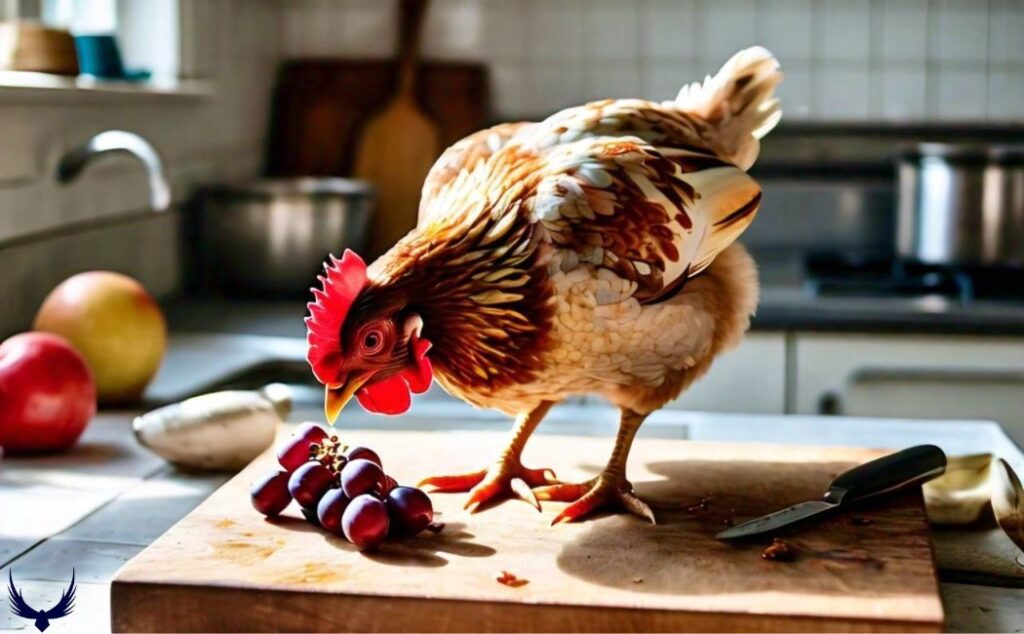
Grapes are also rich in water content, which can help keep chickens hydrated.
Can Chickens Eat Apples?
Apples are a great source of Pectin fiber, which can aid in digestion and help maintain a healthy gut in chickens. They contain Vitamins A, C, and K, as well as minerals like Potassium and Calcium. Apples also provide antioxidants such as Quercetin, which can support the immune system.
Can Chickens Eat Strawberries?
Strawberries are an excellent source of vitamin C, which is essential for a strong immune system in chickens. They are rich in antioxidants like anthocyanins, which can help protect against oxidative stress and support overall health. Strawberries also contain folate, potassium, and manganese, which are important for proper metabolic functions.
Can Chickens Eat Raisins?
Raisins are a good source of natural sugars, which can provide energy for chickens. They contain small amounts of vitamins B6, iron, and potassium. Raisins should be fed in moderation as they are high in sugar and can cause digestive issues if overfed.
Can Chickens Eat Oranges?
Oranges are an excellent source of vitamin C, which is essential for a strong immune system and collagen production in chickens.
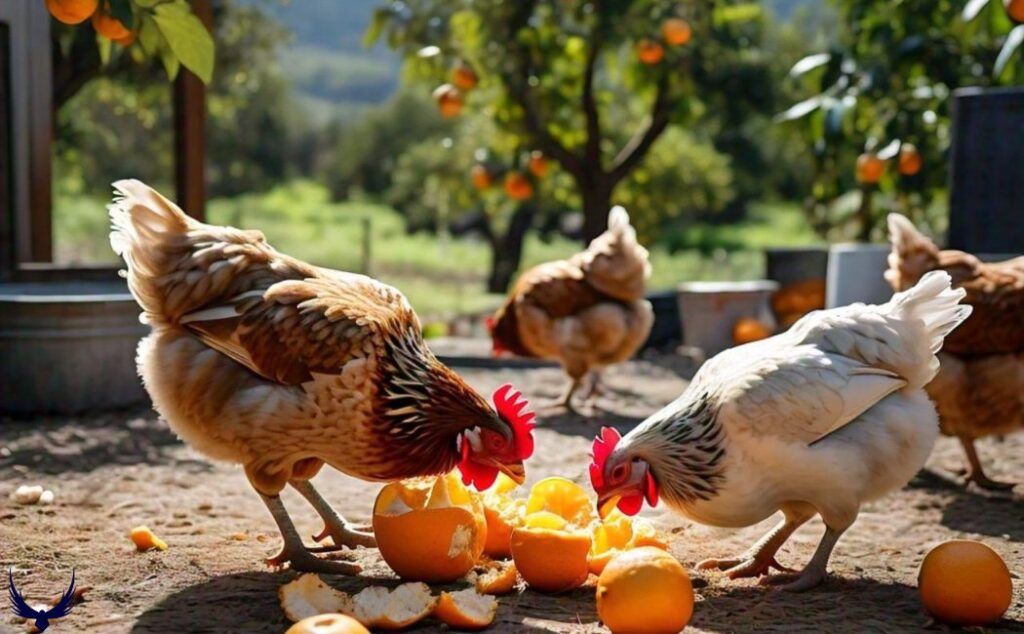
They also provide small amounts of vitamins A, B6, and potassium. Oranges are rich in antioxidants like hesperidin and naringenin, which may help support overall health.
Can Chickens Eat Raspberries?
Raspberries are rich in antioxidants like anthocyanins, which can help protect against oxidative stress and support overall health. They are a good source of vitamin C, which is important for the immune system and collagen production. Raspberries also contain fiber, vitamin K, and manganese, which are important for digestion, blood clotting, and proper bone development respectively.
Can Chickens Eat Mango?
Mangoes are an excellent source of vitamins A and C, which are important for vision, immune function, and overall health in chickens. They contain antioxidants like carotenoids and polyphenols, which may help protect against oxidative stress. Mangoes also provide small amounts of vitamins B6, K, and folate, as well as minerals like potassium and magnesium.
Can Chickens Eat Kiwi?
Kiwi is an excellent source of vitamin C, which is essential for a strong immune system and collagen production in chickens. It contains vitamins E and K, as well as minerals like potassium and copper. Kiwi also provides antioxidants like lutein and zeaxanthin, which may help support eye health and protect against oxidative stress.
Can Chickens Eat Melon?
Melons, such as cantaloupe and watermelon, are a good source of hydration for chickens, as they are high in water content. They contain vitamins A, C, and B6, as well as small amounts of potassium and magnesium. Melons also provide antioxidants like lutein and zeaxanthin, which may help support eye health and protect against oxidative stress.
Can Chickens Eat Blueberries?
Blueberries are rich in antioxidants like anthocyanins, which can help protect against oxidative stress and support overall health. They are a good source of vitamin C, which is important for the immune system and collagen production.
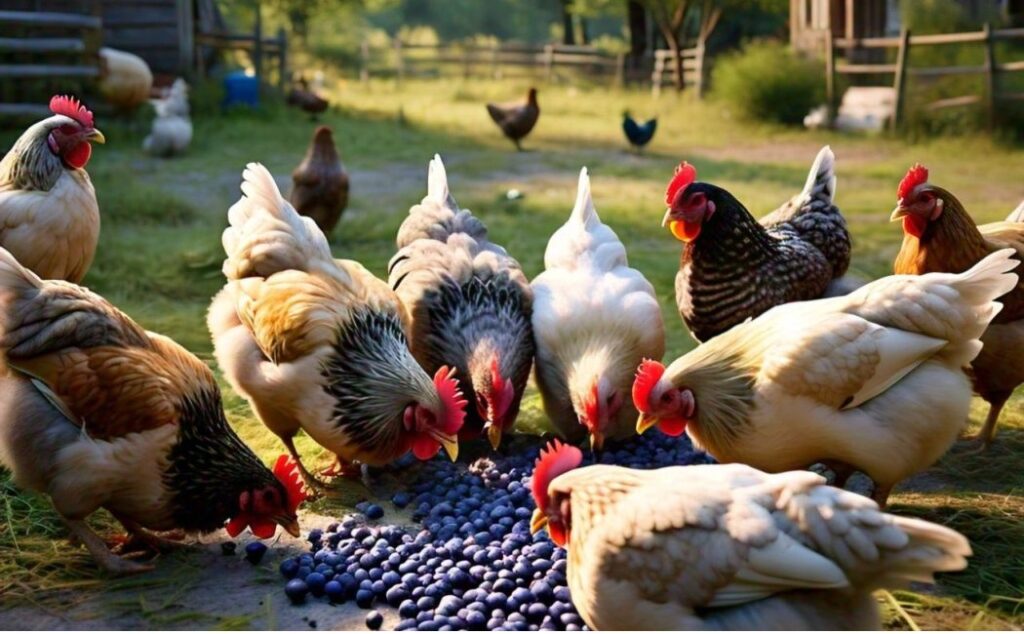
Blueberries also contain fiber, vitamin K, and manganese, which are important for digestion, blood clotting, and proper bone development.
Can Chickens Eat Cherries?
Cherries are a good source of antioxidants like anthocyanins and vitamin C, which may help support the immune system and protect against oxidative stress. They contain small amounts of vitamins A, K, and B-complex vitamins, as well as minerals like potassium and manganese. Cherries also provide fiber, which can aid in digestion and gut health for chickens.
Can Chickens Eat Pineapple?
Pineapple is an good source of vitamin C, which is essential for a strong immune system and collagen production in chickens. It contains bromelain, an enzyme with anti-inflammatory properties that may aid in digestion. Pineapple provides small amounts of vitamins B6, copper, and manganese for chickens.
Can Chickens Eat Plums?
Plums are a good source of vitamin C, which is essential for a strong immune system in chickens. They contain antioxidants like anthocyanins and phenolic compounds, which may help support overall health. Plums also provide small amounts of vitamins A, K, and B-complex vitamins, as well as minerals like potassium and copper.
What Vegetables Can Chickens Eat?
Chickens can safely eat the following vegetables:
Can Chickens Eat Tomatoes?
Tomatoes are an excellent source of vitamin C, which is important for the proper functioning of the immune system in chickens. They contain lycopene, a powerful antioxidant that can help protect against certain types of diseases in chickens.
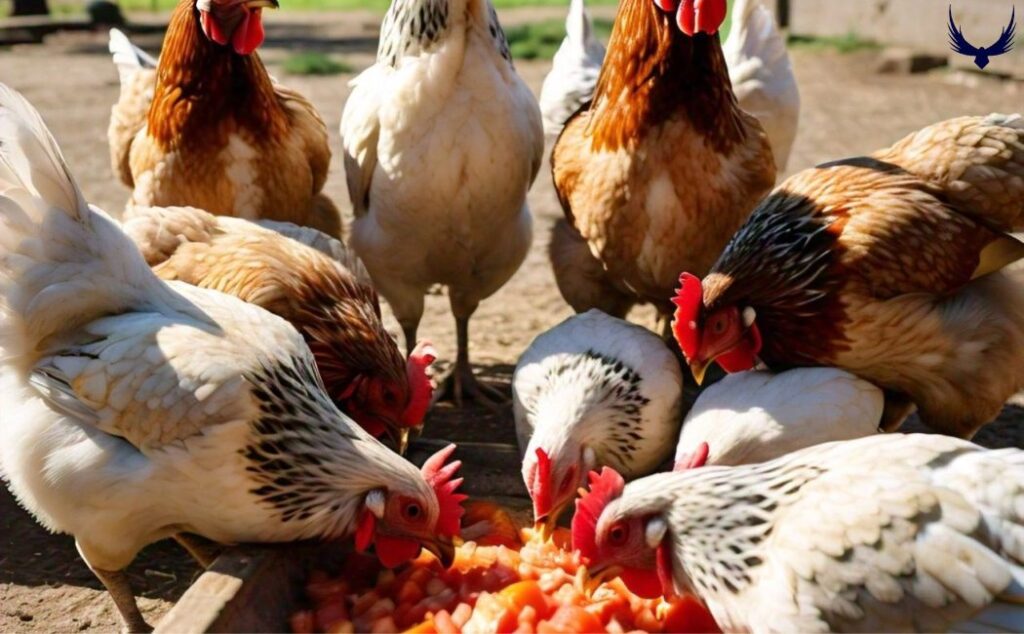
Tomatoes are also rich in potassium and vitamin K, which are essential for bone health and blood clotting, respectively.
Can Chickens Eat Lettuce?
Lettuce is a good source of vitamins A and K, which are important for vision, bone health, and blood clotting in chickens. It is rich in water content, which can help keep chickens hydrated, especially during hot weather. Lettuce also contains small amounts of minerals like calcium, iron, and magnesium.
Can Chickens Eat Celery?
Celery contain vitamins A, C, and K, as well as folate, which is important for proper cell growth and development in chickens. It contains antioxidants like flavonoids and vitamin E, which can help protect against oxidative stress and support immune function.
Celery is also a rich source of dietary fiber, which can aid in digestion and promote healthy gut function in chickens.
Can Chickens Eat Cucumbers?
Cucumbers are a good source of hydration for chickens, as they are high in water content. They contain vitamins K and C, which are important for blood clotting and immune function, respectively. Cucumbers also provide small amounts of minerals like potassium, magnesium, and manganese.
Can Chickens Eat Peppers?
Peppers are an excellent source of vitamin C, which is essential for a strong immune system in chickens. They also contain vitamins A and B6, as well as minerals like potassium and manganese. Peppers provide antioxidants like capsaicin and carotenoids, which may help support overall health.
Can Chickens Eat Cauliflower?
Cauliflower is a good source of vitamin C, which is essential for a strong immune system in chickens. It contains fiber, which can aid in digestion and gut health.
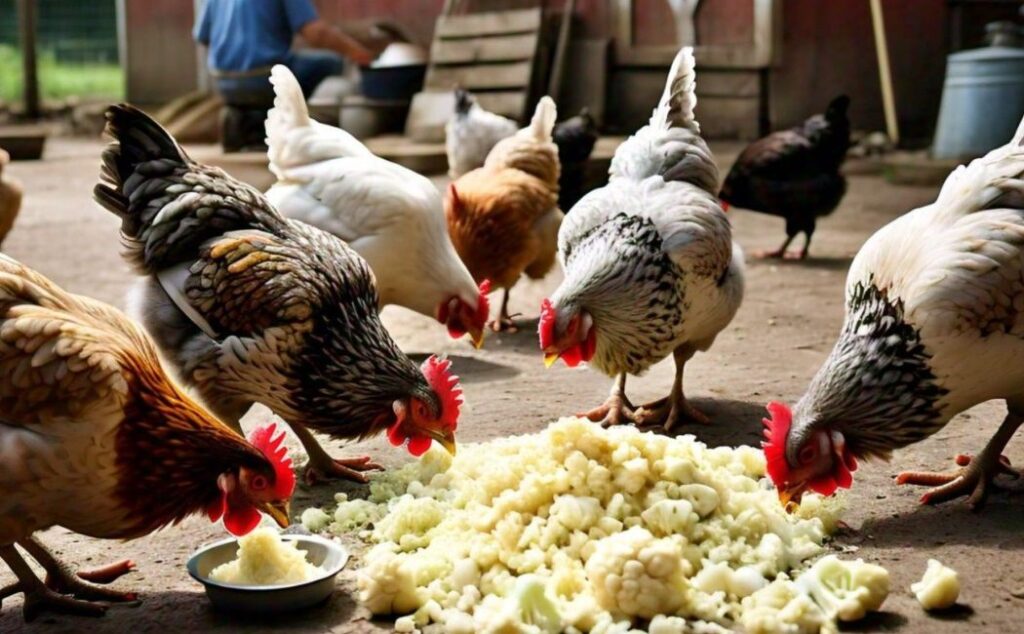
Cauliflower also provides small amounts of vitamins B6, K, and folate, as well as minerals like potassium and manganese.
Can Chickens Eat Green Beans?
Peas are a good source of plant-based protein, which is important for growth, maintenance, and egg production in chickens. They contain vitamins A, C, and K, as well as minerals like iron, zinc, and manganese. Peas also provide antioxidants like lutein and zeaxanthin, which may help support eye health.
Can Chickens Eat Asparagus?
Asparagus is a good source of vitamin K, which is important for blood clotting and bone health in chickens. It contains folate, which is essential for proper cell growth and development. Asparagus also provides antioxidants like glutathione and vitamins C and E, which may help support the immune system and protect against oxidative stress.
Can Chickens Eat Beetroot?
Beetroots are rich in antioxidants like betalains, which may help protect against oxidative stress and support overall health. They are a good source of folate, which is important for cell growth and development. Beetroots also contain vitamins C and B6, as well as minerals like manganese, potassium, and iron.
Can Chickens Eat Kale?
Kale is an excellent source of vitamins A, C, and K, which are important for vision, immune function, and blood clotting in chickens. It contains antioxidants like lutein and zeaxanthin, which may help support eye health. Kale also provides minerals like calcium, iron, and manganese, which are essential for bone development, oxygen transport, and proper metabolism.
Can Chickens Eat Parsnips?
Parsnips are a good source of fiber, which can aid in digestion and gut health for chickens. They contain vitamins C and B6, as well as minerals like potassium, manganese, and magnesium. Parsnips also provide antioxidants like falcarinol and falcarindiol, which may help support overall health.
Can Chickens Eat Carrots?
Carrots are a rich source of beta-carotene, a precursor to vitamin A, which is important for vision, immune function, and reproduction in chickens. They contain antioxidants like lutein and zeaxanthin, which may help support eye health.
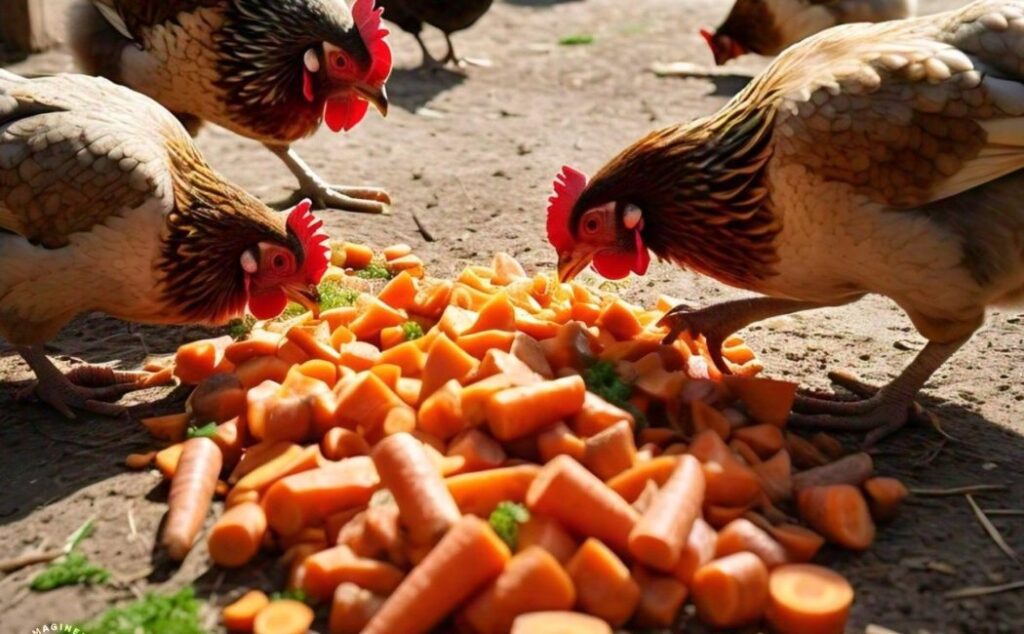
Carrots also provide vitamins C and K, as well as minerals like potassium and manganese.
Can Chickens Eat Broccoli?
Broccoli is an excellent source of vitamins C and K, which are important for immune function and blood clotting in chickens. It contains antioxidants like sulforaphane and indole-3-carbinol, which may help support overall health. Broccoli also provides fiber, folate, and minerals like calcium, iron, and manganese for chickens.
Can Chickens Eat Potatoes?
Chickens can eat cooked potatoes, including the peelings, in moderation. Potatoes are a good source of vitamin C, vitamin B6, potassium, and fiber. Raw potatoes and potato plant leaves should be avoided as they contain solanine, which can be toxic to chickens.
Can Chickens Eat Potato Peelings?
Potato peelings are a good source of fiber, which can aid in digestion and gut health for chickens. They contain small amounts of vitamins C and B6, as well as minerals like potassium, iron, and magnesium. Potato peelings also provide antioxidants like chlorogenic acid and carotenoids, which may help support overall health.
Can Chickens Eat Jalapenos?
Jalapenos contain vitamins A and K, as well as minerals like potassium and iron. These peppers also provide vitamin C and capsaicin, which may boost immunity and improve circulation in chickens. But due to their spicy nature, jalapenos should be offered sparingly as a treat rather than a regular part of a chicken’s diet.
What Herbs Can Chickens Eat?
The following are herbs that chickens can eat:
Can Chickens Eat Parsley?
Parsley is an excellent source of vitamins A and C, as well as iron and calcium. It can help improve egg production and overall health.
Can Chickens Eat Mint?
Both peppermint and spearmint are safe for chickens. Mint can aid in digestion and act as a natural insect repellent.
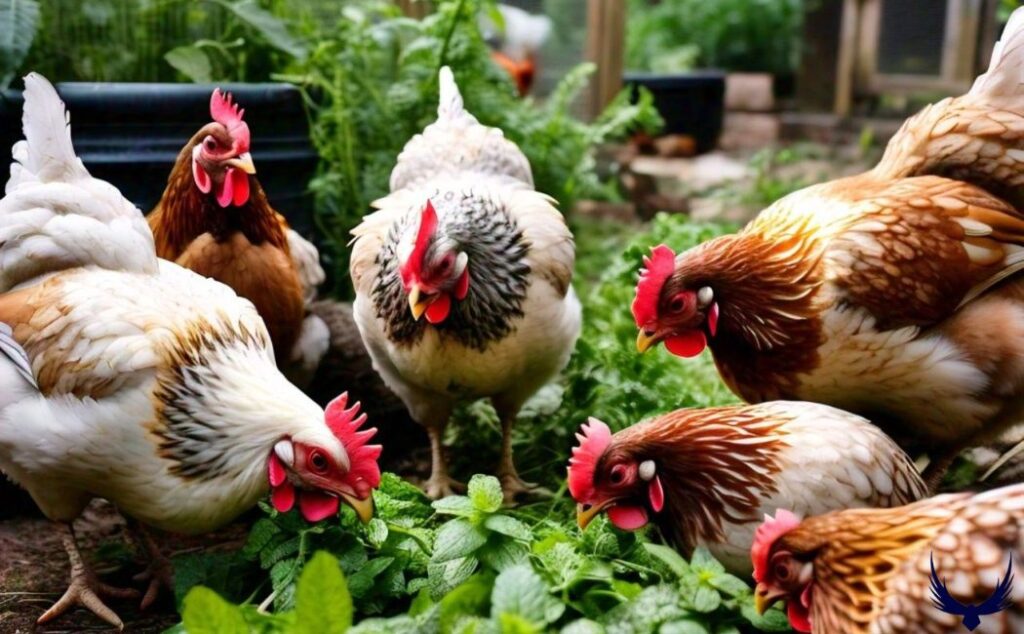
Can Chickens Eat Cilantro?
Cilantro is rich in vitamins A, C, and K, as well as minerals like calcium and iron. It can be fed fresh or dried.
Can Chickens Eat Dill?
Dill is a good source of calcium and can help improve egg production. It also has antimicrobial properties.
Can Chickens Eat Oregano?
Oregano is packed with antioxidants and has antimicrobial properties. It can help boost the immune system and improve respiratory health.
Can Chickens Eat Thyme?
Thyme is rich in vitamins and minerals, including vitamin C, iron, and manganese. It can also help with respiratory issues.
Can Chickens Eat Basil?
Basil is a great source of vitamins A, K, and C, as well as manganese and magnesium. It can improve feather quality and egg production.
Can Chickens Eat Rosemary?
Rosemary is known for its antioxidant properties and can help boost the immune system. It also has antimicrobial and insect-repellent properties.
Can Chickens Eat Lavender?
Lavender has calming properties and can help reduce stress in chickens. It also has antimicrobial and insect-repellent properties.
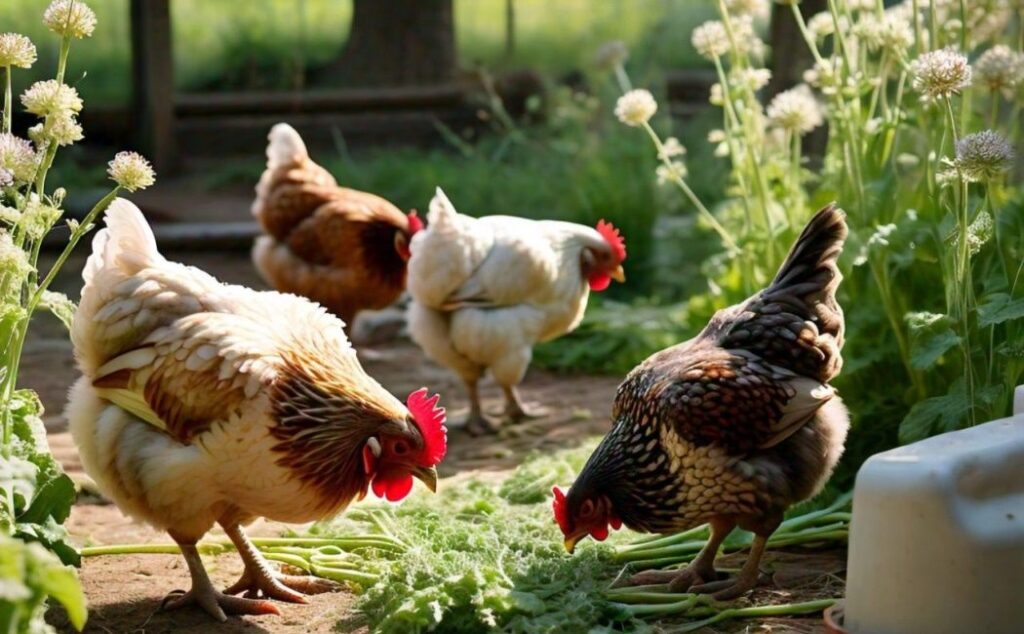
Can Chickens Eat Sage?
Sage is rich in vitamins A, C, and K, as well as minerals like calcium and iron. It can help improve digestion and respiratory health.
Can Chickens Eat Mushrooms?
Mushrooms contain protein which is important for growth, maintenance, and egg production in chickens. They are rich in B vitamins, such as riboflavin, niacin, and pantothenic acid, which are essential for energy metabolism and overall health.
Mushrooms contain antioxidants like selenium and ergothioneine, which can help protect against oxidative stress.
Do Chickens Eat Grass?
Grass is a good source of fiber for chickens, which aids in digestion and gut health. It contains small amounts of vitamins A, C, and E, as well as minerals like iron, calcium, and magnesium. Fresh grass can provide chlorophyll, which has antioxidant properties and may help support the immune system.
What Can Chickens Not Eat?
There are several foods that chickens should not eat as they can be toxic or harmful to their health.
Can Chickens Eat Onions?
Onions should be avoided for chickens as they contain compounds like disulfides and thiosulphates, which can cause hemolytic anemia (destruction of red blood cells) in chickens. Even small amounts of onions can be harmful, so it’s best to exclude them from a chicken’s diet.
Can Chickens Eat Rhubarb?
Chickens can eat stalks of rhubarb, but the leaves should be avoided as they contain oxalic acid, which is toxic to chickens. Rhubarb stalks are a good source of vitamin C, fiber, and antioxidants like vitamin K and lutein.
Can Chickens Eat Avocado?
Avocados should be avoided for chickens, as they contain a fungicidal toxin called Persin, which can cause respiratory distress, heart failure, and even death in chickens.
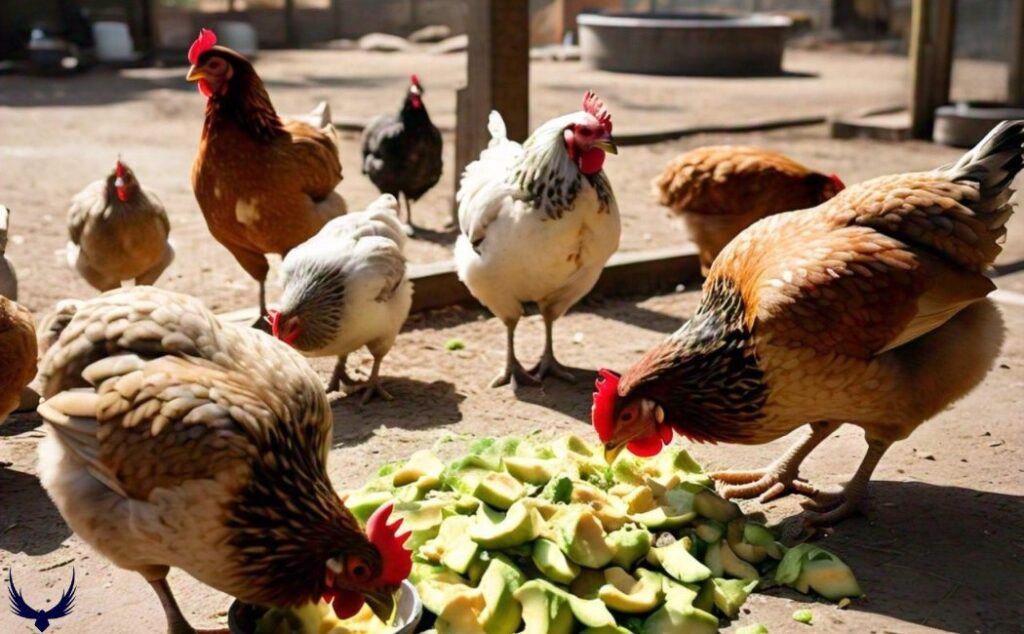
The pit and skin of avocados are high in Persin and should never be fed to chickens.
Can Chickens Eat Bread?
Bread can be fed to chickens in small quantities as an occasional treat. It provides carbohydrates for energy, but lacks essential nutrients found in a balanced chicken feed. Bread should be fed in moderation as it can cause obesity and other health issues if overfed.
How Much do Chickens Eat Per Day?
Laying hens eat about 1/4 to 1/3 pound (113 to 150 grams) of feed daily. Non-laying hens and roosters eat a bit less, around 1/5 to 1/4 pound (90 to 113 grams) per day.
Chicks and young birds eat less, but they eat more as they grow. The amount of food they eat depends on their breed, age, activity level, and the environmental conditions.
What Scraps Can Chickens Eat?
Chickens can eat a variety of kitchen scraps including:
- Vegetable scraps like peelings, tops, and stems
- Fruits and their peels
- Cooked grains, rice, and pasta
- Stale bread and crackers
- Eggshells for calcium
Note: Avoid feeding chickens scraps that are moldy, salty, or contain spices, as these can be harmful to their health.
Top Tips for Feeding Chickens Safely and Effectively
- Ensure a Balanced Chicken Diet: Feed chickens a mix of high-quality commercial feed and natural treats like vegetables, grains, and herbs. Avoid overdoing treats to maintain proper nutrition.
- Provide Fresh Water Daily: Chickens need access to clean, fresh water at all times. Regularly clean water containers to prevent bacteria and ensure hydration, especially in warm weather.
- Stick to a Feeding Schedule: Offer food at the same times daily such as mornings and evenings to create a routine. Consistent feeding schedules support better health and egg production.
- Avoid Foods Harmful to Chickens: Never feed chickens toxic items like raw beans, chocolate, avocado, or salty snacks. These can be harmful or even fatal to their health.
- Use Proper Feeding Equipment: Invest in a sturdy, well-designed chicken feeder to reduce waste and keep feed clean. Scatter treats sparingly to encourage foraging or hang food with chicken coop, which mimics their natural behavior.
- Monitor Their Health Through Diet: Observe their eating habits and physical condition. Healthy chickens will have bright eyes, shiny feathers, and active behavior, indicating a well-balanced diet.
FAQs – What Can Chicken Eats?
Can Chickens Eat Rice?
Rice is a good source of carbohydrates, which can provide energy for chickens. It contains small amounts of vitamins and minerals, including vitamins B, iron, and zinc. Brown rice is a good source of fiber, which can aid in digestion and gut health.
Can Chickens Eat Cheese?
Cheese is a good source of protein, calcium, and vitamin A for chickens. It also contains small amounts of vitamins B12, riboflavin, and niacin, which are important for energy metabolism and overall health. Cheese should be fed in moderation as it is high in fat and can cause digestive issues if overfed.
Can Chickens Eat Mealworms?
Mealworms are an excellent source of protein and essential amino acids for chickens. They are rich in vitamins, minerals, and healthy fats, including omega-3 and omega-6 fatty acids. Mealworms can help promote feather growth and overall health in chickens.

